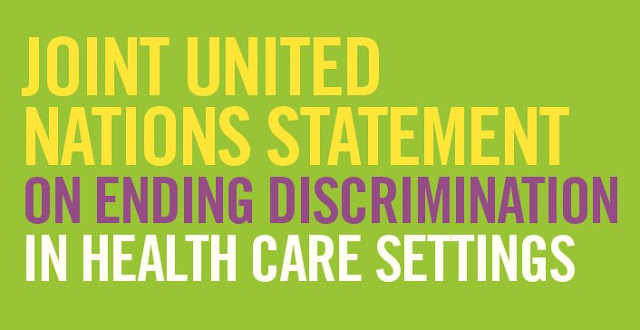United Nations entities recall that a central principle of the 2030 Agenda for Sustainable Development is to “ensure that no one is left behind” and to “reach the furthest behind first”. Recognizing that discrimination in health care settings is a major barrier to the achievement of the Sustainable Development Goals (SDGs), United Nations entities commit to working together to support Member States in taking coordinated multisectoral action to eliminate discrimination in health care settings.
- Reviewing and strengthening laws to prohibit discrimination in the provision and distribution of health care services, as well as in relation to education and employment in the health sector. Laws and policies must respect the principles of autonomy in health care decision-making; guarantee free and informed consent, privacy and confidentiality; prohibit mandatory HIV testing; prohibit screening procedures that are not of benefit to the individual or the public; and ban involuntary treatment and mandatory third-party authorization and notification requirements. All stakeholders should support the clear dissemination, implementation, and monitoring of adherence to such laws and regulations and their translation into policies and practice.
- Reviewing and repealing punitive laws that have been proven to have negative health outcomes and that counter established public health evidence. These include laws that criminalize or otherwise prohibit gender expression, same sex conduct, adultery and other sexual behaviours between consenting adults; adult consensual sex work; drug use or possession of drugs for personal use; sexual and reproductive health care services, including information; and overly broad criminalization of HIV non-disclosure, exposure or transmission.
- Reviewing, strengthening, implementing and monitoring health professional policies, regulations, standards, working conditions and ethics, for the prohibition of discrimination on all grounds in connection to health care settings.
- Ensuring that the labour rights and standards of health workers, including in the area of occupational safety and health, are fully respected, protected, and fulfilled, and that health workers are free from discrimina
tion and violence in the workplace. Particular attention should be paid to the gendered nature of the health workforce, including through ensuring gender-sensitive sectoral and facility-level policies and health professional regulations operationalizing decent work, gender equality, and formal employment of the health workforce. Health workers should be supported in upholding their legal and ethical responsibilities, including with respect to advancing human rights, and their role as human rights defenders should be protected. - Providing pre-service and in-service education to the health workforce on their rights, roles, and responsibilities related to addressing discrimination in health care settings. Policies, programmes and budgets need to provide for a diverse workforce, including through strengthening educational admission criteria and promoting health workforce educational and career development opportunities for women, youth and persons from rural and marginalized communities.
- Empowering users of health care services so that they are aware of and able to demand their rights. This will enable them to hold those responsible accountable for discrimination-free health care settings through rights literacy, patient charters, social accountability monitoring, community support, and other tools.
- Guaranteeing access to effective mechanisms of redress and accountability. This involves development and implementation of individual, tailor-made remedies and redress procedures for victims of violation, and constructive systems of accountability in health and other sectors to prevent future violations.
- Strengthening mechanisms for reporting, monitoring and evaluation of discrimination. This can be achieved through support for the building and sharing of the evidence base and ensuring the participation of affected communities and health workers in the development of health policies.
- Providing sector-specific and joint guidance and practical tools to raise awareness of human rights standards for non-discrimination as they apply to health care settings.




